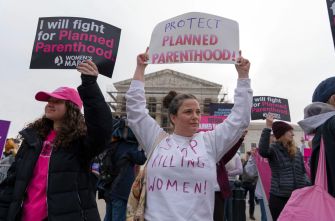In a decision that will have a sweeping impact upon a person’s right to choose their health provider while using Medicaid, the Supreme Court Justices are not in alignment as they consider whether or not the law protects individuals in their right to choose.
The issue on the table is whether federal civil rights laws protect Medicaid funding for Planned Parenthood, a provider that offers patients not only abortions but medical care for diabetes, screenings for cancer, birth control, and more.
The Justices offered their oral arguments recently, for 90 minutes, and came to no final agreement nor decision in regard to the controversial subject of funding Parent Parenthood and how Medicaid should or should not cover patients who receive non-abortion care by providers who also perform abortions.
The current language in Medicaid law in regard to abortion says that Congress created the right to enforce the civil rights of patients, including where they choose to receive care. Congress enacted the law using the spending law of the Constitution, using their legal right to attach “conditions” to the federal funds given to states and U.S. citizens.
South Carolina Governor Henry McMaster, in 2018, ordered the South Carolinas under the Department of Health and Human Services to prohibit all abortion clinics and Planned Parenthood from taking part in the Medicaid program. He said he believes that taxpayer dollars should never subsidize abortion providers.
The governor said that although Planned Parenthood offers numerous non-abortion care for women, such as screenings for diseases including cancer, providing birth control, and other services, any Medicaid funding to their organization and abortion clinics would be subsidizing abortions.
After Governor McMaster’s order to prohibit Planned Parenthood from using the Medicaid funds, the non-profit organization and a patient from South Carolina being treated for her diabetes sued the states for his order in U.S. Court of Appeals for the 4th Circuit federal court. In court documents, attorneys argued that the governor’s order is illegal, because it violates the Medicaid Act, which allows all patients who are eligible for Medicaid to receive health care from any provider of their choosing. The federal court agreed with Planned Parenthood, ruling that the Medicaid Act gives individuals rights that can be “enforced by civil rights laws.” The court barred the South Carolinas from excluding Planned Parenthood from the Medicaid funding.
In a statement about the Supreme Court hearing the case, Governor McMaster said, “I am pleased with the U.S. Supreme Court’s decision today and look forward to the Fourth Circuit thoughtfully reconsidering its previous ruling’ Just as I was when I issued Executive Order No. 2018-21, I remain confident in South Carolina’s authority to administer its Medicaid program and the decision to terminate Planned Parenthood’s funding. I am hopeful that the Fourth Circuit will recognize that Congress did not intend to give Medicaid recipients the ability to force States to subsidize abortion providers like Planned Parenthood."
The appealed case is now before the Supreme Court, with pro and anti-abortion Justices making their arguments. Representing South Carolina’s appeal, Alliance Defending Freedom attorney John Bursch argued that Congress’ spending power require specific wording that is critical to the creation of an individual’s rights. Bursch said that as per law, Congress never used the appropriate legal language that is mandated in regard to any health care providers, in spite of the fact that Congress is concise in other private rights, such as in the Federal Nursing Home Reform Act.
Conservative Justice Clarence Thomas asked Bursch if the word “right” is “absolutely necessary” to establish if a right was created by Congress in this case in regard to the qualifying provider. Bursch, in his reply, told Justice Thomas that “right” is the correct word.
Justice Brett Kavanaugh agreed with Justice Thomas, saying that specific words are necessary in this case. “The Supreme Court has failed to give guidance that lower courts can follow, that states providers, and beneficiaries can follow,” said Justice Kavanaugh. “What words, he asked Bursch, would create such rights, rather than having something like or its functional equivalent, would/could lead to another decade of litigation?”
The debate following this exchange among fellow high Justices addressed the question: Does the federal law only remain in place to protect an enforceable right ONLY if the word is specific, or as Justice Sonia Sotomayor said to Bursch, is the specific word a “magic word?
“You’re not quite calling it a magic word, but you’re coming close,” said Justice Sotomayor.
Justice Sotomayor said she disagreed with Bursch, and that “it seems a little od to think that a problem that motivated. Congress to pass this provision was that states where limited the choices people had. In light of that history, it seems hard to understand that sates didn’t understand they had to give individuals the right to choose a provider.”
Justice Amy Coney Barret agreed with Justice Sotomayor, saying the purpose of the provisions for a qualified provider were centered around an individual’s choice.
“If I want to go see the provider of my choice, but the state has disqualified him from participating in Medicaid, you’re depriving me of my ability to see the provider of my choice,” she noted. “And nobody’s disputing that the physician can provide the services in a competent way.”
The federal government’s attorney Kyle Hawkins said their case shows that “rights creating” statutes are “atypical.” As per the provider provision, he added, the law is a typical spending clause statute.
Planned Parenthood argued that South Carolina clearly violated the Medicaid Act after they denier the Diabetes patient from her choice for her provider. The only issue in the high court, she said, was if they could do something to change this was to sue under the federal rights laws.
The Supreme Court will announce their decision in summer.






